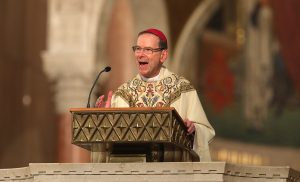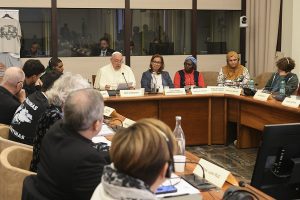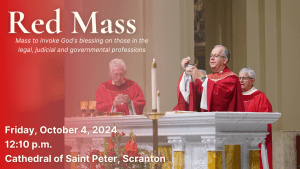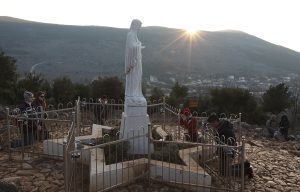(OSV News) – Ending poverty, ensuring nuclear disarmament and regulating artificial intelligence, or AI, were among the issues highlighted by the Holy See at the 2024 United Nations Summit of the Future, held Sept. 22-23 in New York at U.N. headquarters.
The summit – preceded by “action days” Sept. 20-21, and proposed by U.N. Secretary-General António Guterres in his 2021 report, “Our Common Agenda” – convened world leaders to “forge a new international consensus on how we deliver a better present and safeguard the future,” according to the U.N.’s dedicated webpage for the event.
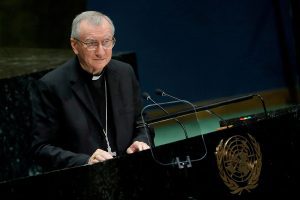
That report and the summit pointed to “an atmosphere of mistrust” that undermines effective global cooperation, something Cardinal Pietro Parolin, the Holy See’s secretary of state, also underscored in his Sept. 23 address at the gathering.
“The current summit is being convened against a backdrop of apparent crisis in the multilateral system,” said Cardinal Parolin. “This is largely attributable to the erosion of trust between nations, as evidenced by the growing prevalence and intensity of conflict.”
More than 120 armed conflicts are currently taking place around the world, involving over 60 states and 120 non-state armed groups, according to the International Committee of the Red Cross, which provides humanitarian aid to, and promotes laws protecting, victims of war. The ICRC also said in a May blog post that the majority of the conflicts are of a non-international nature, with the number of that type tripling since 2000.
Yet amid such strife, “this summit should be a source and a reason for hope,” said Cardinal Parolin.
The cardinal quoted a video message by Pope Francis to the 2017 TED Conference in Vancouver, British Columbia, in which the pope said that to be hopeful “does not mean to be optimistically naive and ignore the tragedy humanity is facing.”
The pope explained in that message, “Hope is the virtue of a heart that doesn’t lock itself into darkness, that doesn’t dwell on the past, does not simply get by in the present, but is able to see a tomorrow.”
Cardinal Parolin told summit attendees that “the future should be constructed on a foundation of principles, including the inherent, God-given dignity of every individual, the promotion of integral human development, the equality and sovereign dignity of all nations, and the establishment of trust between them.”
For that reason, he said, “there is a need to rethink actions in a number of areas.”
The eradication of poverty “must remain the overarching goal of all future action,” with the political will for sustainable development crucial to “a peaceful and prosperous future,” said Cardinal Parolin.
The “reform of international financial institutions, debt restructuring and the implementation of debt forgiveness strategies” are necessary, he said.
A “general disarmament” and “the total elimination of nuclear weapons” are also essential to attaining world peace, with “narrow geopolitical considerations” set aside and “strong economic lobbies … resisted” to ensure human dignity and integral development for individuals and communities, Cardinal Parolin said.
In addition, the cardinal said, “there is an urgent need to regulate” AI, which Pope Francis recently described as “an exciting and fearsome tool.”
“The Holy See advocates for a regulatory framework for AI ethics that encompasses the lifecycle of AI and addresses, inter alia, data protection, accountability, bias, and the impact of AI on employment,” said Cardinal Parolin.
The cardinal also clarified that the church understands the terms “sexual and reproductive health” and “reproductive rights,” used throughout U.N. documents and programs, as “applying to a holistic concept of health” that aligns with the fullness of church teaching on human sexuality.
“The Holy See does not consider abortion or access to abortion or abortifacients as a dimension of these terms,” said Cardinal Parolin.
He added, “With reference to ‘gender,’ the Holy See understands the term to be grounded in the biological sexual identity that is male or female.”
“Above all, thinking of the future should take into account the needs and interests of future generations,” he said.
“If dignity is the foundation and integral human development is the goal of our future, dialogue is the necessary means,” he added.
“Today, the sense of belonging to a single human family is fading, and the dream of working together for justice and peace seems outdated and utopian,” he warned. “This need not be the case, if there is a will to engage in genuine dialogue.”
Quoting Pope Francis’ 2015 address to the U.N. General Assembly, the cardinal said, “The present time invites us to give priority to actions which generate new processes in society, so as to bear fruit in significant and positive historical events. … The future demands of us critical and global decisions in the face of world-wide conflicts which increase the number of the excluded and those in need.”


